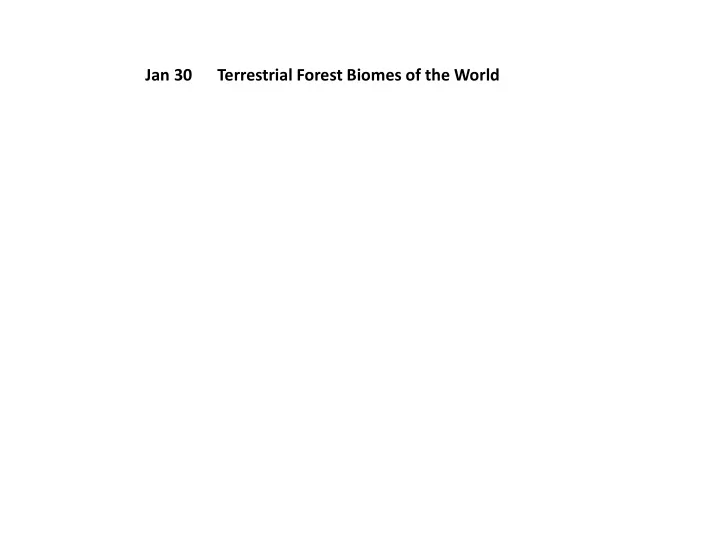

Jan 30 Terrestrial Forest Biomes of the World
World Wildlife Fund Terrestrial Biomes and Biogeographic Realms of the World Olson et al. 2001
World Wildlife Fund Terrestrial Biomes and Biogeographic Realms of the World Biome - large-scale unit of vegetation defined by the physiognomy of dominant, climax vegetation. Elements of physiognomy: • growth form (trees, shrubs, herbs); • function (evergreen, deciduous); • leaf morphology (needle-leaved, broad-leaved); • plant spacing (forest, woodland, savanna).
Terrestrial Forest Biomes of the World Chapin et al. 2011. Fig 2.24
Climate Controls on Biomes Chapin et al. 2011. Fig 2.23
Climate Controls on Biomes Biomes are predictable across the globe because climate varies predictably and plant lifeform, leaf type and spacing are all adaptations for coping with climate and related constraints. Chapin et al. 2011. Fig 2.23
Climate Controls on Biomes: Atmospheric Circulation Chapin et al. 2011. Fig 2.6 .
Climate Controls on Biomes: Atmospheric Circulation . Chapin et al. 2011. Fig 2.8
Climate Controls on Biomes: Atmospheric Circulation . Chapin et al. 2011. Fig 2.9
Climate Controls on Biomes: Ocean Circulation . Chapin et al. 2011. Fig 2.9
Climate Controls on Biomes: Landform Effects Chapin et al. 2011. Fig 2.9 .
Boreal Forest
Boreal Forest (Taiga)
Temperate Forest
Temperate Forest
Desert
Tropical Savanna
Tropical Savanna
Tropical Rain Forest
Tropical Rainforests
Climate Controls on Biomes: Disturbance regimes .
Implications of Global Atmospheric, Ocean, and Landform Patterns Biome physiognomy, distributions and storm disturbances are functions of global abiotic patterns filtered through plant adaptations .
Discussion Question To what extent are ecological system structure, function, and composition predictable based on global abiotic factors alone? What ecological principles may govern such predictions? Trait Biome 1 Biome 2 Biome 3 Vegetation composition Vegetation productivity Vegetation structure Landscape composition and configuration Disturbance regimes Population dynamics Community structure and interactions Humans
Sites for Virtual Biomes World Wildlife Fund. http://www.worldwildlife.org/science/wildfinder/ Map of ecoregions, extensive description, list of species Around the World: A biome Virtual Field Trip http://www.harlingen.isd.tenet.edu/tif/hhs/biome.html#Invitation Oriented towards K-12 groups? MBGnet (Missouri Botanical Garden) http://www.mbgnet.net/ Others?
References Olson, D.M. et al. 2001. Terrestrial Ecoregions of the World: A New Map of Life on Earth. BioScience 51(11): 933-938.
Recommend
More recommend